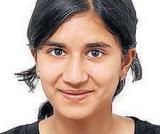 Bangalore, May 18: The State performed exceedingly well in the ICSE and ISC exams by securing a near-100 per cent passing ratio in both.
Bangalore, May 18: The State performed exceedingly well in the ICSE and ISC exams by securing a near-100 per cent passing ratio in both.
Out of the total 9,832 ICSE students and 1,105 ISC students who appeared for the exams in Karnataka, there were only 14 unsuccessful candidates in the former and 13 in the latter. The pass percentage was a staggering 99.86 for ICSE and 98.82 for ISC.
Like previous years, girls from the State outperformed boys in the exams. A total of 4,763 and 522 girls appeared for the ICSE and ISC exams, respectively, and their passing ratio was 99.92 per cent in ICSE and 99. 43 per cent in ISC. There were only seven unsuccessful girl candidates, both exams combined.
Alisha Kalyanpur from Inventure Academy, Whitefield was tremendously pleased with her outstanding performance of 98.2 per cent in ICSE. “I am glad that my hard work has finally paid off. Such results only encourage me to aim higher,” she said.
Alisha has not decided what to pursue in higher studies, but is clear about one thing: “I want to do something that will be for the good of the community and the people.” Sanitha Jugulum from Bishop Cotton Girls" School, St Marks Road notched up a staggering 98.6 per cent in ISC?Commerce and topped her school in the stream. “I knew I would do well, but I really did not expect such a high percantage,” she said.
Having scored 100 in both Economics and Mathematics, Sanitha wants to attend the Shri Ram College of Commerce in New Delhi to pursue an honours degree in Economics.
Sanitha has big plans for the future, and wants to do a PhD in Econometrics from Harvard or Cambridge, and then join the Planning Commission. “Her hard work has paid off extremely well”, said her father Jugulum Ramesh, a chartered accountant.
The girls faced stiff competition from the boys, who secured impressive pass percentages of 99.80 and 98.28 in ISCE and ISC, respectively. A total of 5,069 and 583 boys appeared for their ICSE and ISC respectively, out of whom there were only 10 unsuccessful candidates in each.
Alistair Lewis, a student of Clarence High School, Richards Town, was among the toppers in the City in ISC, having scored an excellent 98 per cent.




Comments
Add new comment